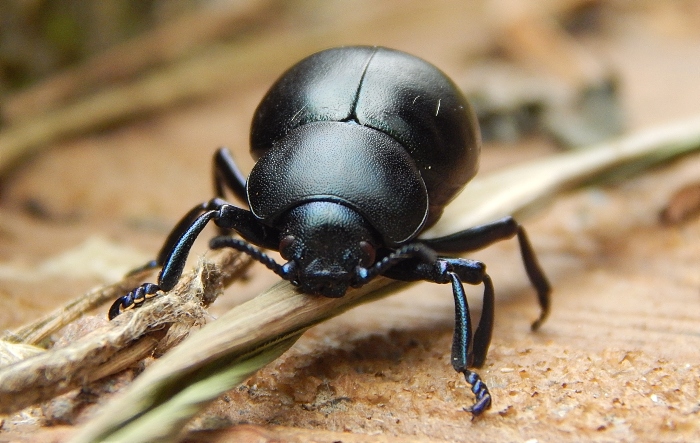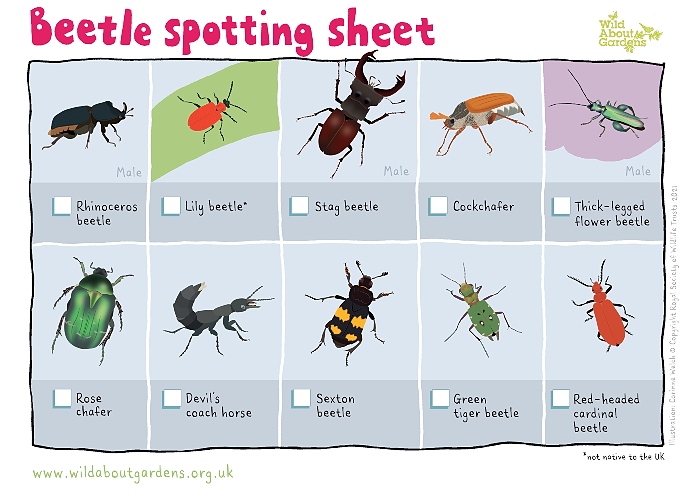
Cheshire Wildlife Trust and RHS are urging local gardeners to help beetles after topsy turvy weather this spring could have impacted the population.
Early June is seen by entomologists to be ‘peak beetle’ season across the UK, when many species are out in force looking for a mate.
But conservationists fear that topsy turvy weather in the spring – including an exceptionally cold April followed by a deluge of rain in May – could have had a detrimental impact on beetle populations.
The 2021 Wild About Gardens “Bring Back Our Beetles” campaign is calling on gardeners to support beetles.
They want people to record different kinds found in their garden using iNaturalist – a popular nature app which helps people identify and record wildlife using their phone.
And to create beetle banks in their garden, by planting species such as hawthorn, dogwood, and hogweed, and herbs including angelica, fennel, and chervil.
Adam Linnet, Wilder Communities Coordinator for Cheshire Wildlife Trust, said: “We at the Trust create homes for beetles across the region by restoring meadows, tree planting and digging ponds. You can help where you live work and play too.
“If you took part in No Mow May, or if you have a wild patch in your garden, then just let it be for the summer, giving beetles somewhere to call home.
“By making space for them and helping beetles grow in number, we can provide a buffet of food for familiar species such as sparrows, even the occasional blackbird. And why stop at just your garden?
“With a little help from your friends, or helping your neighbourhood to come together, just imagine what we could do for these wonderful insects!
“It’s been a very wet May, but here comes the sun, so now is the perfect chance to record the beetles in your garden.
“So get out there and I’ve got a feeling it won’t be long until you fall in love with these fantastic pollinators.”
Helen Bostock, senior horticultural advisor at the RHS, added: “At last the warmer weather has meant gardeners can get out into their gardens.
“Plants are growing at speed and wildlife is really starting to get active too.
“The wet May means you’re more likely to see ‘Maybugs’ or cockchafers in June instead this year! Anyone who has been leaving a patch of grass to grow long can now expect to see weevils and beetles on flowering daisies and buttercups and, if they’re really lucky, a glow worm or two among the grass.
“There’s still time to stop mowing a section of lawn for the summer or benefit your local beetle population by making a beetle bank.”
There are more than 4,000 beetle species across the UK, but many are really struggling due to habitat loss, use of pesticides and fertilisers, and unpredictable weather caused by climate change.

People are being encouraged to look out for:
• Soldier beetles – Medium-sized, narrow beetles that feed on aphids and are commonly found on open structured flowers like daises and hogweed. There are around 40 species of soldier beetle in the UK, with various colour combinations of black, red, and orange.
• Click beetles – Also known as snapping beetles and skipjacks, click beetles have an unusual ability to jump at impressive speed. By arching their backs, they create tension in a special hinge on their thorax, which they can release suddenly, causing them to flip out of the way of danger. There are 65 species of click beetles in the UK and, with many of them looking very similar, it can be quite a challenge to tell them apart!
• Longhorn beetles – Longhorn beetles get their name because of their long antennae. Most species are associated with dead wood, where the larvae develop, though several longhorns use the stems of herbaceous plants. Well-known longhorns include musk beetles – noted for their musky secretion, and wasp beetles, which favour dead willow and birch. Not only are wasp beetles coloured like wasps, but they mimic their movements too.
Pledge your patch for beetles and download a Bring Back our Beetles guide at www.wildaboutgardens.org.uk
If you want to see wildlife-friendly gardens and learn more about how you can make your own space for wildlife, visit Cheshire Wildlife Trust Open Garden events this summer.
(Pics – featured image (c) Zach Haynes)





















Recent Comments